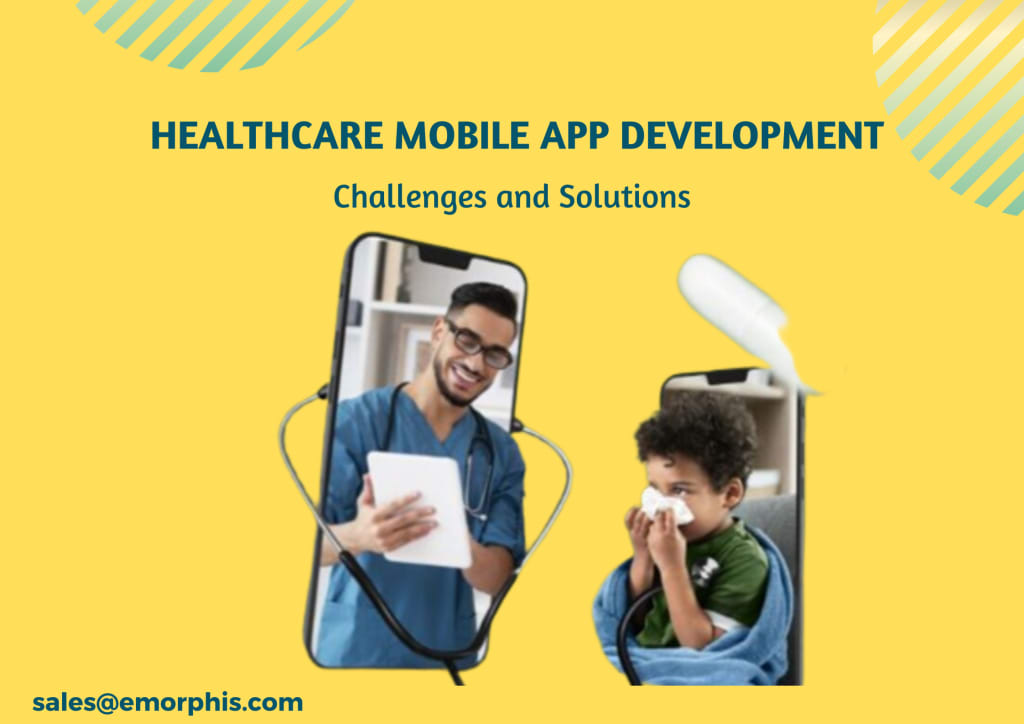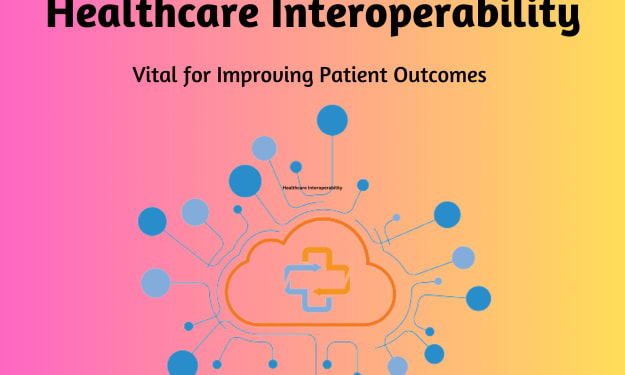Challenges and Solutions in Healthcare Mobile App Development
Healthcare Software Development

Healthcare Mobile App Development Market Outlook
The healthcare mobile app development market has been growing rapidly in recent years, driven by the increasing use of mobile devices in healthcare, rising demand for remote healthcare services, and the growing importance of healthcare technology. According to a report by Research and Markets, the global healthcare mobile app development market was valued at USD 4.22 billion in 2020 and is expected to reach USD 15.07 billion by 2028, growing at a CAGR of 16.8% from 2021 to 2028.
The COVID-19 pandemic has accelerated the growth of the healthcare mobile app development market as it has led to a surge in demand for telemedicine and remote healthcare services. Healthcare mobile apps have played a critical role in providing remote consultations, monitoring patients' health, and managing chronic conditions.
The healthcare mobile app development market is also benefiting from the increasing adoption of wearable devices and the Internet of Things (IoT) in healthcare. Wearable devices and IoT-enabled devices can collect real-time health data, which can be analyzed and used to improve patient outcomes.
What Is Mobile App Development for Healthcare?
Mobile app development for healthcare refers to the process of creating software applications that are designed to support and improve healthcare delivery and patient outcomes. These apps are typically developed for use on mobile devices, such as smartphones and tablets.
Healthcare mobile apps can have a variety of features and functions, including:
Telemedicine: Many healthcare mobile apps enable remote consultations with healthcare providers, allowing patients to access medical care from the comfort of their own homes.
Remote Patient Monitoring: Healthcare mobile apps can monitor patients' health in real-time, collecting data on vital signs, medication adherence, and other health indicators. This data can be used to improve care coordination and make more informed treatment decisions.
Chronic Disease Management: Healthcare mobile apps can help patients manage chronic conditions, such as diabetes and heart disease, by tracking symptoms, providing medication reminders, and offering educational resources.
Wellness Tracking: Healthcare mobile apps can also help patients track their wellness goals, such as physical activity, nutrition, and sleep. This can promote healthy habits and prevent the onset of chronic disease. Impact Of COVID-19 On Global Healthcare
The COVID-19 pandemic has had a significant impact on the global healthcare industry. Here are some of the ways in which the pandemic has affected healthcare:
Increased Demand for Healthcare Services: The COVID-19 pandemic has led to a surge in demand for healthcare services, particularly in regions with high numbers of COVID-19 cases. This has put significant strain on healthcare systems and has highlighted the need for increased capacity and resources.
Telemedicine and Virtual Care: The pandemic has accelerated the adoption of telemedicine and virtual care technologies, as healthcare providers have had to find new ways to deliver care while minimizing in-person contact. Telemedicine and virtual care have become essential tools for providing remote consultations, monitoring patients, and managing chronic conditions.
Digital Health Innovation: The pandemic has spurred innovation in the digital health space, as developers have worked to create new tools and technologies to support remote healthcare delivery. This includes the development of new healthcare mobile apps, wearables, and other connected devices.
Supply Chain Disruptions: The pandemic has disrupted global supply chains, including those for medical equipment and supplies. This has led to shortages of critical equipment, such as personal protective equipment (PPE), and has highlighted the need for more resilient supply chains in the healthcare sector.
Increased Awareness of Public Health: The pandemic has increased public awareness of the importance of public health measures, such as hand hygiene and social distancing. This has led to increased interest in preventative healthcare and has highlighted the importance of public health infrastructure.
Why do you need a healthcare app?
A healthcare app can provide several benefits, making it a valuable tool for individuals, healthcare providers, and organizations in the healthcare industry. Here are some of the reasons why you might need a healthcare app:
Access to healthcare services: A healthcare app can provide convenient access to healthcare services, allowing individuals to schedule appointments, consult with healthcare providers, and access medical records, all from the comfort of their homes.
Improved patient engagement: Healthcare apps can improve patient engagement by providing patients with personalized healthcare information, tracking their progress, and allowing them to communicate more effectively with their healthcare providers.
Better disease management: Healthcare apps can help individuals manage chronic conditions, monitor their symptoms, and track their progress. By providing patients with real-time data and insights, healthcare apps can help them make more informed decisions about their health.
Increased efficiency: Healthcare apps can improve the efficiency of healthcare providers by streamlining communication and reducing administrative tasks. By automating routine tasks, healthcare providers can focus on delivering high-quality care.
Cost savings: Healthcare apps can help reduce healthcare costs by improving disease management, reducing hospital readmissions, and minimizing unnecessary healthcare visits.
Things To Consider Before Developing a Healthcare App
Before developing a healthcare app, there are several important factors that you should consider. Here are some key considerations:
Compliance with regulatory requirements: The healthcare industry is heavily regulated, and it's important to ensure that your app complies with all relevant regulations, such as HIPAA (Health Insurance Portability and Accountability Act). This may require working with a legal team to ensure that your app meets all necessary requirements.
Security and privacy: Healthcare data is highly sensitive, and it's important to ensure that your app uses strong security measures to protect user data. This includes encrypting data, implementing access controls, and ensuring that user data is not shared with unauthorized parties.
User experience: Your app should be easy to use and navigate and should provide users with clear and concise information. This may require conducting user testing and incorporating user feedback into the app design.
Integration with healthcare providers: In many cases, healthcare apps will need to integrate with healthcare providers' systems, such as electronic health records Integration. It's important to ensure that your app is compatible with these systems and can seamlessly exchange data with them.
Scalability: As your app grows in popularity, it's important to ensure that it can handle increased traffic and usage. This may require using cloud-based infrastructure and implementing strategies for scaling up resources as needed.
Monetization strategy: Healthcare apps can be costly to develop and maintain, so it's important to have a clear plan for how the app will generate revenue. This may involve charging users directly, partnering with healthcare providers, or offering premium features for a fee.
By carefully considering these factors before developing your healthcare app, you can increase the likelihood of success and ensure that your app meets the needs of both users and healthcare providers.
Why Healthcare Startups Fail
Healthcare startups face many challenges, and there are several reasons why they fail. Here are some common reasons why healthcare startups fail:
Insufficient market research: Many healthcare startups fail because they do not conduct sufficient market research before launching their product or service. This can result in developing a product that does not meet the needs of the target market, or not understanding the competition and how to differentiate from them.
Lack of funding: Healthcare startups require significant funding to develop and bring products to market. Without sufficient funding, startups may not be able to develop and market their product effectively or may run out of cash before generating revenue. Healthcare startups may also require longer investment horizons due to regulatory hurdles and longer sales cycles.
Regulatory challenges: Healthcare startups must comply with strict regulatory requirements to ensure patient safety and data privacy. This can be a significant hurdle for startups that lack the resources or expertise to navigate the complex regulatory landscape.
Lack of experienced talent: Healthcare is a complex and specialized industry that requires significant expertise. Many healthcare startups struggle to attract and retain the talent they need to develop and bring their products to market. Without experienced talent, startups may struggle to innovate, grow and differentiate.
Failure to scale: Even if a healthcare startup develops a successful product or service, they may struggle to scale their operations and grow their customer base. This can be due to a lack of resources, inefficient operations, or poor execution.
By understanding these common reasons why healthcare startups fail, entrepreneurs can take steps to avoid these pitfalls and increase their chances of success. This includes conducting thorough market research, securing sufficient funding, hiring experienced talent, navigating regulatory hurdles, and executing a sound growth strategy.
How can emorphis technologies assist you in the development of healthcare software applications?
Emorphis Technologies can assist in the development of healthcare software applications in several ways. Firstly, their team of experienced developers and designers can work closely with healthcare professionals and stakeholders to understand their specific needs and requirements and translate them into functional and user-friendly software solutions.
Secondly, Emorphis Technologies can leverage their expertise in cutting-edge technologies like artificial intelligence, machine learning, and big data analytics to create healthcare software applications that are not only efficient and effective, but also have the potential to revolutionize the industry.
Thirdly, Emorphis Technologies can help healthcare organizations to integrate their software solutions with existing systems and technologies, ensuring seamless and secure data exchange and workflow management.
Overall, with their deep domain knowledge, technological expertise, and commitment to delivering high-quality software solutions, Emorphis Technologies is well-equipped to assist in the development of healthcare software applications that can improve patient outcomes, streamline workflows, and drive operational efficiency in the healthcare industry.
About the Creator
Larisa Albanians
Hey, a healthcare technology solutions provider at emorphis, that is helping organizations to deliver better healthcare solutions.






Comments
There are no comments for this story
Be the first to respond and start the conversation.